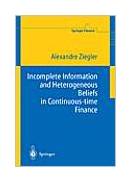|
||
• wydawnictwa polskie
• Zamów informacje o nowościach z wybranego tematu • kontakt
• Cookies na stronie |
INCOMPLETE INFORMATION AND HETEROGENEOUS BELIEFS IN CONTINUOUS TIME FIZIEGLER A.wydawnictwo: SPRINGER , rok wydania 2003, wydanie Icena netto: This book considers the impact of incomplete information and heterogeneous beliefs on investor's optimal portfolio and consumption behavior and equilibrium asset prices. After a brief review of the existing incomplete information literature, the effect of incomplete information on investors' exptected utility, risky asset prices, and interest rates is described. It is demonstrated that increasing the quality of investors' information need not increase their expected utility and the prices of risky assets. The impact of heterogeneous
beliefs on investors' portfolio and consumption behavior and equilibrium asset prices is
shown to be non-trivial. Heterogeneous beliefs can explain a number of observed phenomena,
such as the fact that equilibrium state-price densities are not log-normal, the
"smile" in option implied volatility, and the patterns of implied risk aversion
reported recently in the literature. It is also demonstrated that financial markets in
general do not aggregate information efficiently, a fact that can explain the equity
premium puzzle. 240 pages Księgarnia nie działa. Nie odpowiadamy na pytania i nie realizujemy zamówien. Do odwolania !. |


